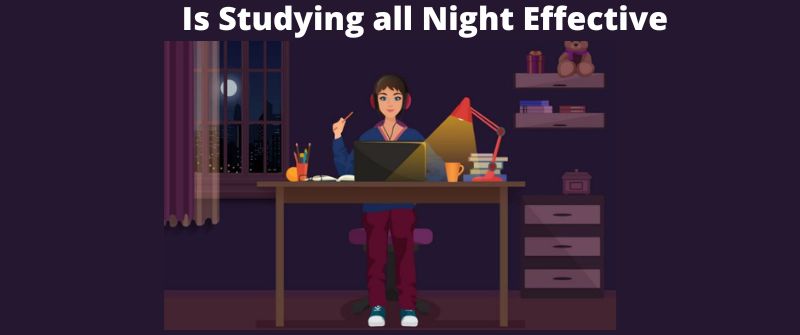Is Studying all Night Effective: Pros and Cons of Day and Night

When I was studying for my master’s, I loved to grind it late to get more points or have the assignment done. But that was not always effective. However, it worked for me.
Therefore, the question is whether it is good for most people, as it was for me. Well, this is interesting but the truth may be shocking for some of us.
Studying all night can sometimes be seen as an effective way to get more studying done, especially if you have a looming deadline or exam. However, while it might seem like a good idea at the time, it can actually be counterproductive and have negative consequences on your academic performance and overall well-being.
Reasons why Night Studies might not be Effective

- Lack of sleep: When you study all night, you’re sacrificing your sleep, which can negatively affect your memory consolidation and information retention. Sleep is essential for cognitive function and performance, and a lack of sleep can lead to poor focus, memory lapses, and impaired critical thinking skills.
- Diminished attention and focus: As you become more tired, your attention span and focus can start to wane. This can lead to decreased productivity and efficiency, as well as an increased likelihood of making mistakes.
- Diminished critical thinking skills: When you’re sleep deprived, your brain isn’t functioning at its best. Your critical thinking skills can be impaired, which can negatively affect your problem-solving ability and your ability to analyze and comprehend complex concepts.
- Physical health consequences: Staying up all night can take a toll on your physical health. It can lead to fatigue, headaches, and muscle tension, and it can also increase your risk of getting sick.
- Increased stress and anxiety: All-night studying can increase stress and anxiety, especially if you feel unprepared or overwhelmed by the amount of work you have to do. This can lead to a decreased sense of well-being and motivation, and can further impact your academic performance.
Studying at Night vs Morning
Overall, while studying all night might seem like a quick fix, it can have long-term negative consequences on your academic performance and your health.

Instead of relying on all-nighters, it’s better to plan your study schedule in advance and give yourself plenty of time to prepare.
This will help you avoid stress and allow you to get enough sleep and rest, which will ultimately lead to better academic performance and overall well-being.
Trying to study at night is not always the best. Even if you try to study in the bedroom, you will alter your concentration.
The best time to study varies depending on an individual’s preference, daily routine, and lifestyle. Some people may prefer studying in the morning while others may find that studying at night works best for them. Here are some advantages and disadvantages of studying at night vs. morning:
Pros and Cons of Studying at Night
Advantages:
- Fewer distractions: Studying at night can be beneficial because there are usually fewer distractions, such as phone calls, emails, and social media notifications.
- Peace and quiet: At night, it is usually quieter, which can help you focus and concentrate on your studies.
- More time: If you have a busy schedule during the day, studying at night can give you more time to focus on your studies.
Disadvantages
Fatigue: Nighttime studying can lead to fatigue and tiredness, which can negatively impact your focus and retention.
Sleep disturbances: Studying late into the night can disrupt your sleep cycle, leading to sleep disturbances, and reducing the quality of sleep.
Social isolation: Studying at night can be socially isolating, as others are likely asleep, and it might not be possible to work with study partners.
Pros and Cons of Studying in the Morning
Advantages

- Refreshed mind: Mornings can be an ideal time to study because your mind is refreshed and rejuvenated from a good night’s sleep.
- Boosted energy: Starting your day with some study can help boost your energy levels and increase your motivation throughout the day.
- Positive mindset: Studying in the morning can help to cultivate a positive mindset for the rest of the day, increasing your overall sense of well-being.
Disadvantages:
- Early wake-up: If you’re not a morning person, waking up early to study can be challenging.
- More distractions: Mornings can be busy, with family members and roommates getting ready for work or school, which can create distractions.
- Time constraints: If you have a busy day ahead, it might be challenging to find enough time to dedicate to studying in the morning.
In conclusion, there is no one-size-fits-all answer when it comes to the best time to study. It ultimately depends on an individual’s personal preferences, daily routine, and lifestyle.
The most important thing is to find a study schedule that works for you and stick to it consistently. This will most likely avoid dozing as you study or feeling tired.
Side Effects of Studying Late Night
Studying late at night can have several side effects on an individual’s health and academic performance. Here are some of the most common side effects of studying late at night:
- Sleep disturbances: Staying up late to study can interfere with an individual’s sleep cycle, which can lead to sleep disturbances. A lack of sleep can negatively impact an individual’s overall health, mood, and cognitive performance.
- Reduced productivity: When individuals are tired and sleep-deprived, their productivity levels can decrease. This can make it difficult to retain information and complete assignments efficiently.
- Impaired cognitive function: Staying up late can lead to impaired cognitive function, including poor memory, difficulty in retaining information, and reduced problem-solving skills.
- Increased stress and anxiety: Staying up late can increase stress and anxiety, especially if an individual has a lot of work to do and feels overwhelmed. This can negatively impact their mental health and overall well-being.
- Decreased physical health: Staying up late can lead to decreased physical health, including fatigue, headaches, and muscle tension. It can also increase the risk of getting sick and impair the immune system.
- Social isolation: Studying late at night can lead to social isolation as individuals might miss out on social activities and lose touch with friends and family.
Overall, it’s important to prioritize good sleep hygiene and avoid staying up late to study regularly. Individuals should aim to establish a healthy study routine that allows them to get enough rest, manage their workload effectively, and minimize the negative side effects of late-night studying.
If individuals find that they are struggling to keep up with their studies, it might be beneficial to seek help from a tutor, mentor, or academic advisor to better manage their academic workload.

